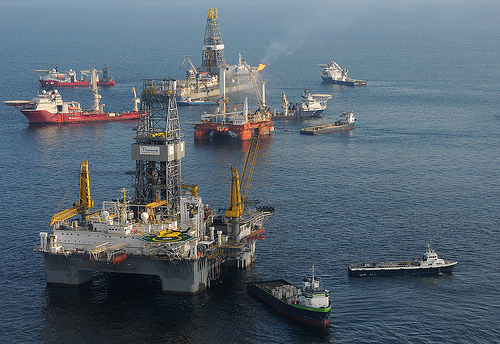 Penn State historian Adam Rome studies the American environmental movement and is working on a book about the first Earth Day, which was prompted in part by an offshore drilling disaster in Santa Barbara. Yesterday, he told the Washington Post that it could take another year before we can tell if the Gulf oil leak yields real environmental progress. He fleshed out that thought in a conversation with Grist.
Penn State historian Adam Rome studies the American environmental movement and is working on a book about the first Earth Day, which was prompted in part by an offshore drilling disaster in Santa Barbara. Yesterday, he told the Washington Post that it could take another year before we can tell if the Gulf oil leak yields real environmental progress. He fleshed out that thought in a conversation with Grist.
—–
Q. We’ve seen a lot of hand-wringing among greens about not seeing any large-scale progress since the Gulf of Mexico spill. It’s a dire thought that something this big isn’t enough to spur a change in our relationship with oil. But, historically speaking, are greens being too impatient?
A. I think they are being too impatient. First of all, the disaster’s not over. It’s not like the Exxon Valdez where one ship crashed and you know there’s a finite amount of oil in that ship. It’s not even like the Santa Barbara oil spill [from an offshore rig blowout], which again was much smaller, but getting it under control was a lot easier. We’re all keeping our fingers crossed that BP does successfully stop it one way or another this month, but they might not.
We also don’t really know enough yet about what the implications might be. People talk cavalierly about the whole Gulf ecosystem being wrecked, but we don’t know exactly how this will affect the economy and the environment over a longer haul.
There’s also been report after report about the way BP has stifled press access, so I don’t think there have been as shocking images as there were in 1969 with Santa Barbara. Partly because we’ve seen them before, but partly because even if they are there to be seen now, the access has been limited. For all the stupid publicity mistakes that BP’s CEO has made, they are much savvier about PR than Exxon was in 1989 [after the Valdez spill] or UniCal in ’69.
Q. What’s been the timeline for other changes spurred by environmental disasters?
A. The Santa Barbara oil spill happened in January 1969. Right away, people were appalled. In Santa Barbara itself, the spill brought together people who had never been allied before — countercultural students and very wealthy Republicans alike were shocked. But still, it took a long time for it to lead to something more than just “we might need more regulation on offshore oil,” and more than just preventing that one specific thing from occurring again.
Gaylord Nelson, the senator from Wisconsin who had the idea for Earth Day, was a guy who didn’t need to have any kind of environmental consciousness-raising. He had already been on the case for a decade. But even with him it was not until he flew over Santa Barbara in August 1969 that he was really appalled. That led to planning the first Earth Day, but it didn’t happen until 15 months after Santa Barbara.
Earth Day was far bigger than Nelson ever dreamed it would have been. But again, it takes a while for the anger to mature, to ripen, into a sense of what a truly constructive response would be. The first response is to blame somebody and to try to punish somebody, and that’s easy with a corporation as huge as BP. But that doesn’t solve any of the deeper questions.
Q. You suggested to the Post that if we haven’t started addressing oil dependence in a year “it’s a sign that we’ve entered into some newer, more passive mode of responding to disasters.” What do you mean by that?
A. It’s possible that we’ve become desensitized, that it’s harder and harder to shock ourselves, so that’s why I use the word passive. If nothing’s happened in a year, we’ll know whether this is going on.
For most of the time between 1980 and 2008, we’ve had national political leadership that has been hostile to the idea that government can be an agent of reform, change, and improving the lives of citizens. In spite of Obama and “yes we can” and the people that voted for him, I’m not sure that they’ve really come to believe that we can, if “we can” means that we can help address some of the deepest problems of society through government. And it’s possible that they don’t really, in their deepest hearts, believe that they can make a difference in the political realm. I’m not saying either one of those is true, but a year from now, if the disaster turns out to be as big as people imagine and we don’t respond, then you have to wonder.


